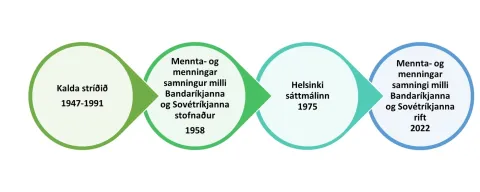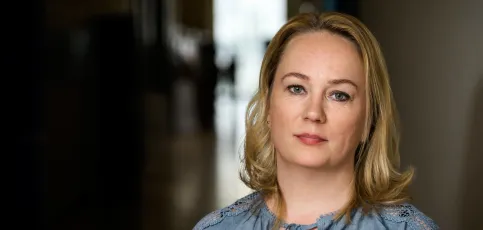
"My interest was first piqued when I saw stories about couples who were divided, that is people who were married but were unable to live together. I saw an opportunity to explore the Cold War and the conflict between superpowers from the perspective of the impact it had on personal lives," says Rósa Magnúsdóttir, professor of history at the University of Iceland.
Many people probably think of the Cold War, which took place between 1947-1991, mainly as an arms race between two superpowers: the USA and the USSR. But the Cold War also touched people's private lives, including their marriages. Love knows no borders, but the Soviet Union made it difficult for its citizens to consider marrying a foreigner.
Explored the history of Russia and Eastern Europe in her PhD
Rósa completed a BA in history with a minor in political science from the University of Iceland in 1999 and immediately went on to do a PhD in the US. At the University of North Carolina at Chapel Hill, Rósa learned Russian history at the Department of History, which specialised in the topics of Russia and Eastern Europe. "I wrote a PhD thesis about the Cold War from the Soviet perspective – Soviet propaganda and ideology during the Cold War." Rósa was based in the US but spent considerable time in Russia and learned to speak Russian. She also spent a lot of time in Germany, before moving to Denmark after her PhD and living there for 15 years. Rósa has worked at the University of Iceland since 2021 and has recently moved back to Iceland with her whole family.
A book by Steinbeck inspired the research
Rósa is now working on research which has its roots back in the days of her PhD. She was completing her thesis about Soviet propaganda against the US after the Second World War. "I found a reference in a very famous book, A Russian Journal by the American author John Steinbeck, which is about his travels in the Soviet Union in 1947." Steinbeck provides a powerful portrayal of the postwar period, when the Soviet Union lay in ruins.
The book describes Steinbeck's visit to a diplomat's club in Moscow, where he met distraught Soviet women who were unable to leave the USSR, despite being married to American and British men. "That immediately caught my interest. Who are these women, sitting there in some diplomat's club, married to foreigners but forbidden from leaving the Soviet Union?" says Rósa. Steinbeck's account became the inspiration behind her current research.




